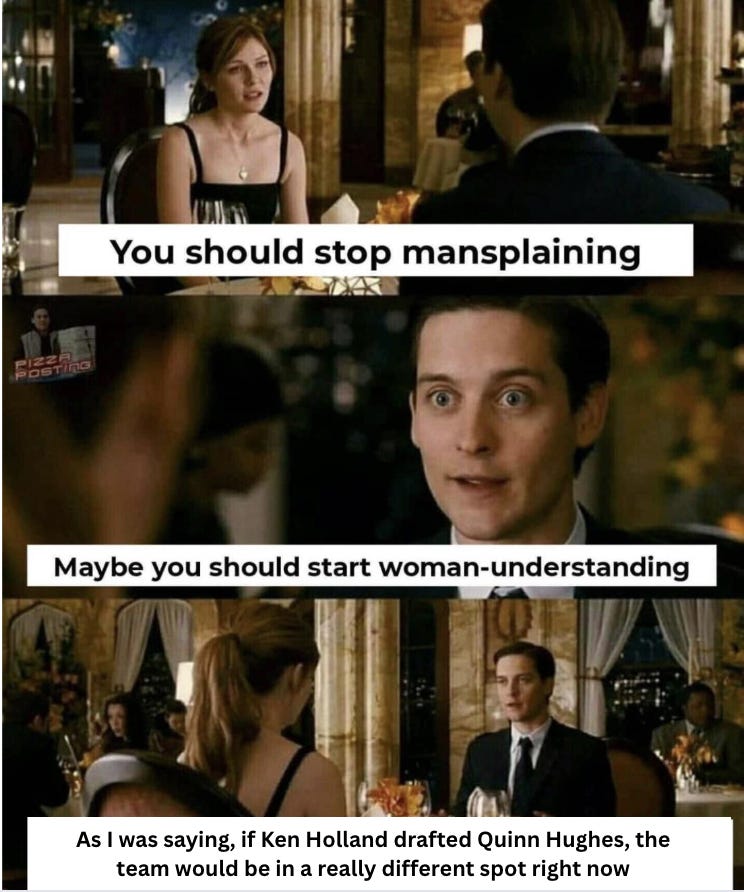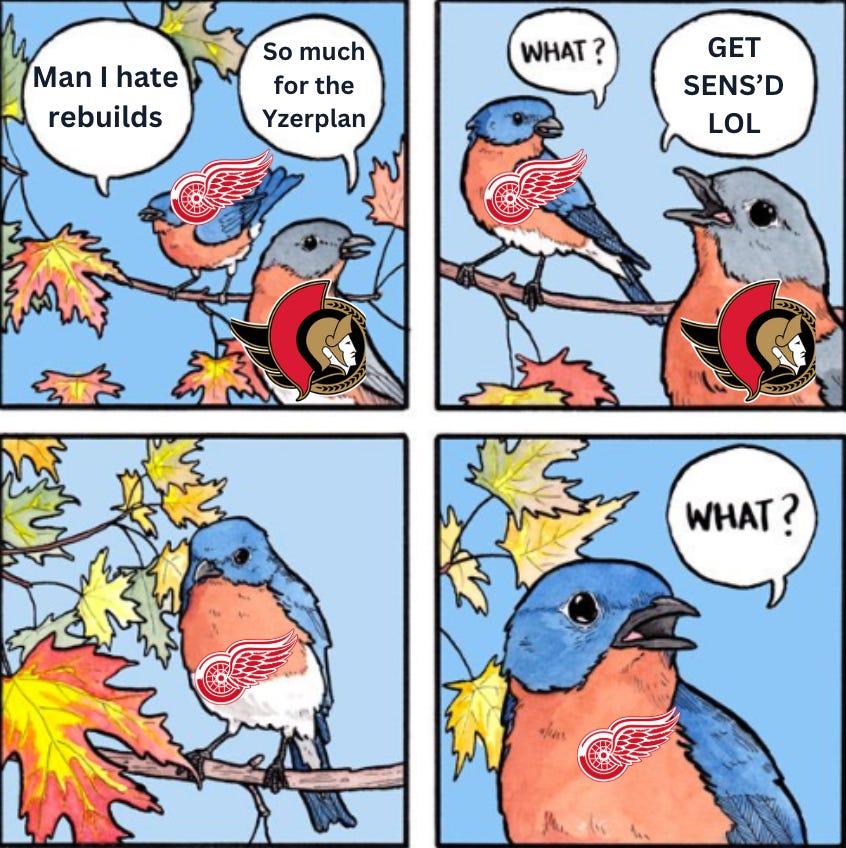Why missing the playoffs isn't so bad, part one
Maybe the Red Wings are going to be okay after all
You might read the headline and think “yeah this is cope”. In a way, I suppose it is. The Detroit Red Wings have missed the playoffs for the ninth consecutive year in a row. By all accounts, the vibes this year were worse than they were the year prior. What else can you do when you’re the team with the second-longest playoff drought in hockey? You can sit and stew about your team’s failure, or you can try to make light of the positives. Well, friends, I’m here to deliver some of the latter: and what better way to do it than being a hater?
We’re in the Conference Finals of the Stanley Cup Playoffs now. Four teams remain: the Dallas Stars, Edmonton Oilers, Florida Panthers, and Carolina Hurricanes. Whether it be injuries or investment, the rest of the sixteen teams that made it just couldn’t cut it. What can the Red Wings learn from their failures — and what can they expect moving forward?
Why every playoff team failed in round one
Montreal Canadiens - Their first major push
Habs fans were pleasantly surprised when their team made the playoffs, but they knew what to expect. This is, after all, the team’s first foray into the postseason since the Make-A-Wish trip to the 2020 Cup Finals. I doubt most fans expected the team to make much of a dent in the playoffs, but, hey, they won a game against an absolutely loaded Washington Capitals team. Young guys got their time to shine and learned the pace of the playoffs. While the scoresheet may suggest otherwise, this was an overall net positive for the Habs.
Key takeaways for Detroit: It’s entirely possible that Detroit will be in this exact position next year. They’ll push for a spot in the playoffs and likely face up against the Florida Panthers or another absolutely loaded squad. They might win a game (or two), but it’s important to not take it personally if things take an ugly turn. After all, they’re just getting started.
Now, if only the Wings had a Lane Hutson-type defenseman…
New Jersey Devils - Injuries and lack of depth
Look, you can only do so much without your star player. The Devils entered the playoffs sans Jack Hughes, and his presence was sorely missed early on. As the series with the Hurricanes continued, injuries piled up until the team just couldn’t find their scoring touch. It didn’t help that Carolina plays a defense-first style, as well. The Devils seem to oscillate between legit contenders and a shaky core. They’ll be back, but they’ll need to make a splash if they want to be for real next season.
Key takeaways for Detroit: Star players are difference-makers, but depth is what wins in the playoffs. Take a look at the Stars: they managed to beat the Colorado Avalanche without their top forward (Jason Robertson) and top defenseman (Miro Heiskanen). Depth is the question the Devils (and the Wings) will have to answer this offseason.
Tampa Bay Lighting - Fatigue, no offense
After making the Finals three times in a row, the Lightning have been eliminated in the first round for the third time in a row. Could this be due to fatigue? A lack of offensive depth? Or are the Panthers just that good? Perhaps there’s truth in all three statements. It didn’t help that Oliver Bjorkstrand, one of their top acquisitions, suffered an injury right before the playoffs.
The Lightning’s 2020 and 2021 Cups were won largely in part by bottom-six players like Blake Coleman and Yanni Gourde stepping up to the plate. While they’ve done a decent job replacing that talent, the new bottom-six “core” was too inexperienced to make the dent the Lightning needed.
Key takeaways for Detroit: Chemistry is the name of the game. Star players can make or break a series, but nothing helps better than a team working in conjunction.
Ottawa Senators - Young core, first time
Much like the Habs, the Sens are just getting started in the playoffs. It wouldn’t be a shock to see the Senators and Red Wings clash quite often in the coming years. There’s already a growing rivalry between the most terminally online members of each fanbase. While they did lose to the Michael Jordan of Choking in the Toronto Maple Leafs, they managed to put up a good fight. Linus Ullmark’s ugly .880 save percentage didn’t help, though.
Key takeaways for Detroit: Going big game hunting for a starting netminder is all fun and games until he can’t bail you out. Once Ullmark started laying eggs, it was all over.
St. Louis Blues - No game-breakers
The 2019 Blues are proof that you don’t need a superstar player to win the Stanley Cup. You do, however, need a lot of positive things to happen at the same time. They did have a few this year: Cam Fowler played out of his mind, depth players showed up, and Jordan Binnington did what he could to keep the team in the series. But the downfall of the Blues is their lack of a surefire star player. Robert Thomas and Jordan Kyrou are great, but they need someone that’s going to get them to the next level if they want to be a consistent contender.
Key takeaways for Detroit: The closest thing to a game-breaker the Wings have right now is Lucas Raymond. If he can keep improving (and if Yzerman can add at least one other game-breaker), they’ll be in business.
Colorado Avalanche: Top-heavy downfall
The Avs have almost the complete opposite problem to the Blues. Colorado has a top line and top defensive pairing that other teams only wish they could build. They’ve got the second-best player in the league (Nathan MacKinnon) and the best defenseman in the league (Cale Makar). So what happened?
Well, apart from their top line and top pairing, pickings were slim. The only player to score at a point-per-game pace or higher was MacKinnon. They swung for the fences in a trade for Brock Nelson and didn’t get a single goal out of it. To top it all off, they had to face off against the Stars in round one — a matchup that would’ve tested any team in the league.
Key takeaways for Detroit: Star power isn’t everything. The Avs know this well, as they won their Cup in 2022 off the back of Valeri Nichushkin and a bevy of bottom-six threats. Yzerman will need to find his playoff performers to build a contender.
Minnesota Wild: Shaky special teams
The Wild had four chances in the final game of their series against the Golden Knights to score a power play goal. They fumbled every opportunity, and, in doing so, spelled doom for their series. As if that wasn’t bad enough, their penalty kill fell victim to the Golden Knights more times than they’d like to admit. While, yes, they’ve got a young core and one of the best prospect pools in the NHL, they’re not beating New Maple Leafs allegations anytime soon.
Key takeaways for Detroit: The once-anemic power play of the past took a big step this year, but they’ll need to catapult the penalty kill to the next level to avoid suffering the same fate of the Wild.
Los Angeles Kings: Where to begin?
Between baffling coaching decisions, strange lineup layouts, and repeatedly losing to a goalie with a sub-800 save percentage, this was a mess of a series for the Kings. To top it all off, they’ve made Ken Holland their new general manager. Who did they piss off to make this their fate? Drew Doughty and Anze Kopitar are only getting older, and the rest of the team doesn’t seem ready to fill the void they’ll leave. This is about as nightmarish as the early-mid 2010s Wings of old.
Key takeaways for Detroit: It could always be worse. We could be back in the Ken Holland era.




